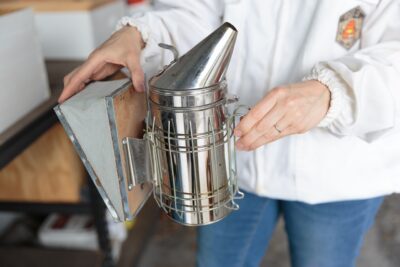Starting beekeeping requires essential equipment to ensure the well-being of the bees and the success of your apiary. Here is a brief overview of the fundamental equipment you’ll need:
- Hive Components:
- Hive Bodies (Brood Boxes): These are the main boxes where the bees live and raise their brood. Typically, new beekeepers start with two deep brood boxes. Some beekeepers may choose medium brood boxes for lighter weight.
- Supers: Smaller boxes placed above the brood boxes where bees store honey. Beginners often use medium supers for honey storage. The bigger the box the more honey you can harvest!
- Frames and Foundation:
- Frames: Wooden or plastic frames fit inside the hive bodies and supers. Bees build comb on these frames.
- Foundation: Either beeswax or plastic sheets with an embossed honeycomb pattern, providing a guide for bees to build their comb.
- Protective Gear:
- Bee Suit: A full-body suit made of light, protective fabric to shield you from bee stings.
- Veil: Protects your face and neck. It can be attached to the suit or worn separately.
- Beekeeping Tools:
- Smoker: Used to produce cool smoke that calms bees during inspections.
- Hive Tool: A versatile tool for prying apart hive components, scraping off excess propolis, and more.
- Feeding and Watering Equipment:
- Feeder: Used to provide supplemental food, especially during the initial stages when the colony is establishing itself.
- Water Source: Bees need water, so having a nearby water source is essential.
- Queen Excluder:
- A device placed between the brood boxes and honey supers to prevent the queen from laying eggs in honey storage areas.
- Extractor:
- If you plan to harvest honey, an extractor is crucial. It spins honey out of the frames without damaging the comb.
- Storage and Transportation:
- Beehive Stand: Elevates the hive off the ground, preventing moisture and making inspections easier.
- Hive Covers: Protects the hive from the elements.
- Education Resources:
- Beekeeping Books or Courses: Equip yourself with knowledge about bee behavior, hive management, and troubleshooting. Make time to watch beekeepers on Youtube and books such as the Beekeeper’s Bible and Beekeeping for Dummies are great starting points.
Starting beekeeping demands dedication and continuous learning. As you gain experience, you may explore additional tools and equipment to enhance your beekeeping venture. Always prioritize the well-being of your bees for a thriving apiary.




